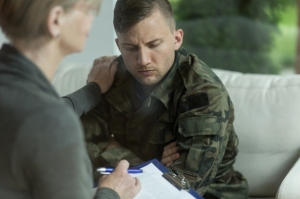by
Lauren Dubinsky, Senior Reporter | February 01, 2016
Military service can be a life-altering experience, and a lack of understanding from physicians can result in inferior care for returned veterans. A new University at Buffalo (UB) study explored the need for health care systems and providers to develop a better understanding of military culture in the interest of improving outcomes.
“The military is a unique institution, with its own structure, terminology, and culture, and military service is often a profound experience that changes the service member’s identity, and his/her assumptions and expectations about the world,” Lisa Butler, the study’s first author and associate professor in the UB school of social work, told HCB News.
“All these factors can present challenges to providers and systems of care if they don’t ask about a military service history and don’t know how to incorporate that information into the care they provide," she said.
The researchers asked four different groups — two male, one female and one comprising the veterans’ family members — about their health care experience and the gaps in health and mental health care. The team used a sample of veterans in the community rather than one recruited from patients in the U.S. Department of Veterans Affairs (VA) health care system.
One of the things that veterans feel health care providers don’t understand is that they don’t complain about small things. It takes a lot for a veteran to seek help, so a medical complaint should never be viewed as trivial, said Butler.
“We certainly hear veterans voice their concerns that civilian providers and systems ‘just don’t understand,’” she added.
It’s well known that post-traumatic stress disorder (PTSD) is prevalent among veterans — about 11 to 20 percent of those who served in Operations Iraqi Freedom and Enduring Freedom will experience PTSD in a given year, according to the U.S. Department of Veteran Affairs.
The burden of PTSD on returning veterans can be dramatic. A recent
New York Times report provides several unsettling examples of the kind of behavior that can accompany this mental disorder.
“I think that better identification of the signs and symptoms for a range of conditions that can result from service or combat is essential, including (but not limited to) those of post-traumatic conditions, depression and anxiety, substance use, and traumatic brain injuries,” said Butler.
She also mentioned that it’s important for health care providers to develop an understanding of how the effects of these conditions may cause other difficulties including the inability to readjust in relationships, parenting or their jobs.
In a paper published in the journal
Military Behavioral Health, the researchers detailed that health care providers should have a basic education in general characteristics of military life and its culture and values and ideals and their implications for post-service adjustment and health care utilization.
An understanding of the stressors that service places on individuals and families, and how to monitor clients for problems that military populations commonly experience are also needed, as well as acknowledgement and respect for the discipline and sacrifice of those who serve and their families, said Butler.
If providers cultivate what Butler refers to as “military/veteran cultural competence,” they will be able to deliver better care. But she cautioned that if providers don’t understand that, then they won’t be as effective in the care they provide.
